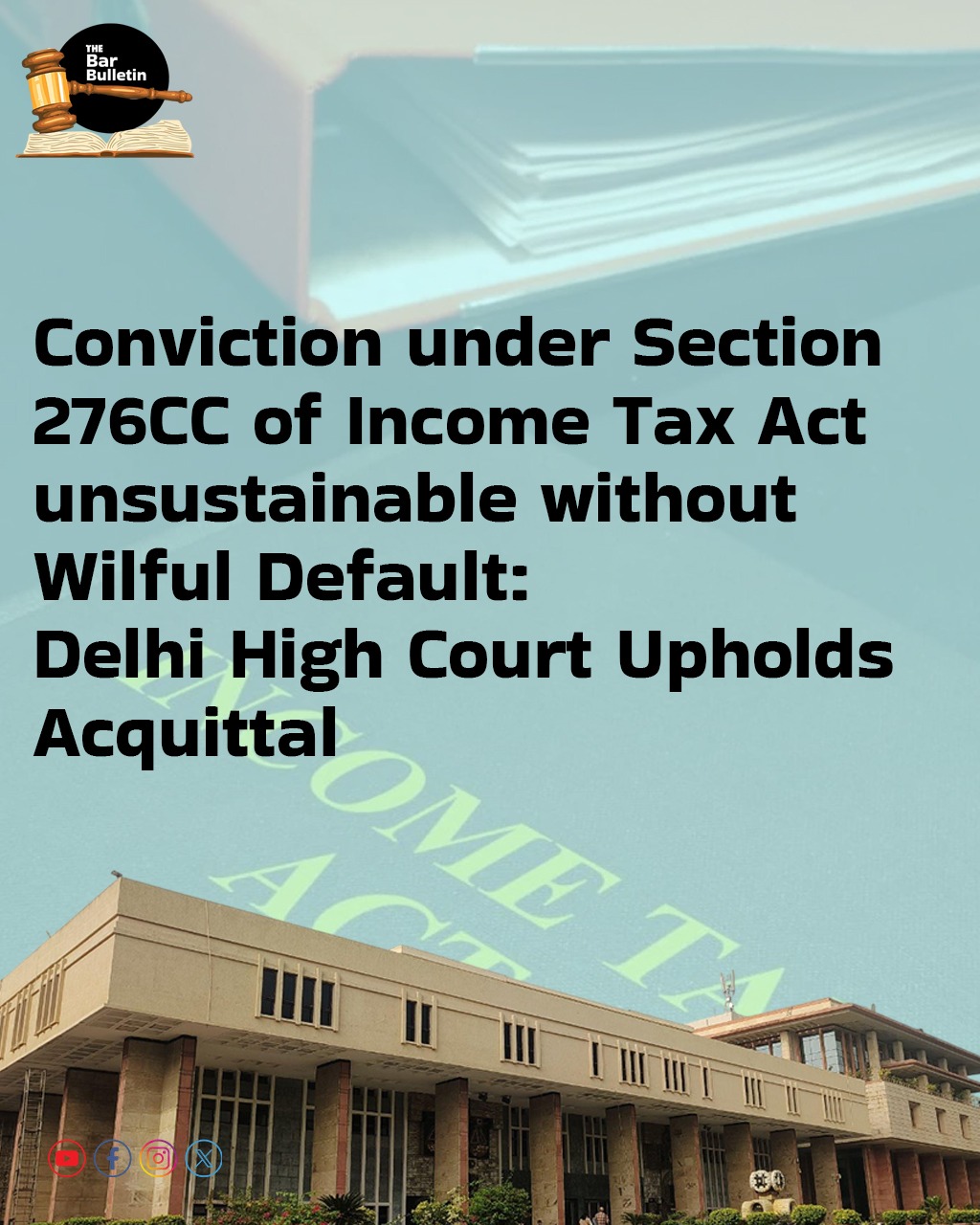While overturning the findings of the Sessions Court, whereby it was held that quashing of penalty under Section 271(1)(b) of the Income Tax Act will neutralise the separate statutory offence under Section 276CC and the criminal prosecution therein, the Delhi High Court recently ruled that once a notice under Section 153A was duly served, and the taxpayer fails to file a return within the prescribed period, the statutory breach stood crystallised, irrespective of subsequent compliance or parallel proceedings u/s 271(1)(b).
Emphasizing that prosecution u/s 276CC for failing to file returns in response to Section 153A notice is a distinct cause of action and is independent from penalties u/s 271(1)(b) for non-compliance with a Section 142(1) notice, the Single Judge Bench of Justice Sanjeev Narula observed that the cancellation of penalty u/s 271(1)(b) does not ipso facto vitiate the prosecution u/s 276CC, especially when the latter is founded on a separate statutory default. The decision of the Supreme Court in Vinubhai Mohanlal Dobaria v. Chief Commissioner of Income-tax [(2025) 2 S.C.R. 476] was referred to reinforce that the obligation to file returns within the statutory timeframe is not directory but mandatory, and a breach of this obligation, in the absence of reasonable cause, invites penal consequences, including prosecution under Section 276CC.
However, noticing the absence of ‘mens rea’ enshrined under Section 278E, the Bench held that non-compliance with statutory notices u/s 153A by the Respondent could not be characterised as deliberate or wilful, and therefore, the very foundation necessary to sustain a conviction u/s 276CC stands vitiated. Accordingly, the Bench upheld the acquittal recorded by the Sessions Court.
In this case, almost 13 years ago, a search was conducted at the premises of Century Communication Group, where the Respondent served as a director, acting on allegations of tax evasion and banking fraud, where various documents were recovered and seized. Consequently, a notice u/s 153A was issued to the Respondent directing him to file his return for 7 assessment years. However, there was continued non-compliance with the show cause notices on multiple occasions, backed by mere contention of inability to file returns based on circumstances beyond control. In the meanwhile, the Respondent filed a belated tax return declaring an income of INR 44.28 lacs, which was essentially a verbatim reproduction of the original return filed way back in 2005. Finding this return to be inadequate as it failed to substantively address the specific queries, the Department asked for the personal appearance of the Respondent and to furnish explanations regarding the deposit of INR 64.70 lacs in Citibank and the purchase of a flat in Mumbai in 2004 for INR 88.19 lacs. Again, there were non-compliances by the Respondent, who later sought compounding of the offence u/s 153A. Rejecting the application for compounding as premature and owing to continued failure on the Respondent’s part to file his returns, the Department initiated criminal proceedings u/s 276CC and passed an assessment u/s 144 at INR 1.97 crores. Additionally, parallel penalty proceedings u/s 271(1)(b) were also initiated against the Respondent. On appeal, the CIT(A) quashed the penalty, but the Trial Court sentenced the Respondent to simple imprisonment for 4 years along with a fine of INR 2 lakhs in each case. However, the Additional Sessions Judge set aside the conviction and acquitted the Respondent of all charges.
Finally, when the matter reached the High Court, the Single Judge concurred with the Department that the mere setting aside of penalty u/s 271(1)(b) by itself does not automatically nullify the criminal prosecution u/s 276CC. However, pointing to the Respondent’s demonstrated efforts and the CIT(A)’s findings, the Bench upheld the acquittal recorded by the Sessions Court, though based on an erroneous legal premise, essentially owing to the distinct ground of absence of wilful default.
Case Distinguished:
K.C. Builders & Another v. Assistant Commissioner of Income Tax – (2004) 2 SCC 731
Appearances:
Advocates Gaurav Gupta, Shivendra Singh, Yojit Pareek, and Surya Jindal, for the Petitioners
Advocate Lav Dhawan, for the Respondent



